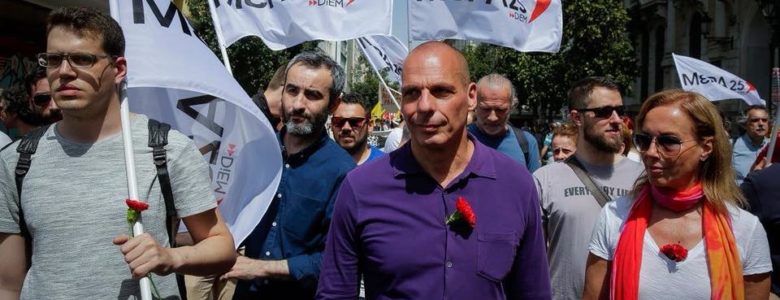
Why MeRA25 is the only hope for Greece now – and why I will be there to help make it happen
Dear friends,
On April 28, I shall temporarily be moving to Athens. I will be there to support MeRA25 [DiEM25’s Greek political party] in our European electoral battle. Now, you may ask, why would a Portuguese citizen move to Greece to do such a thing? Well, because this is a matter very close to my heart, and ought to be close to yours too. Let me tell you why.
In 2015, when Syriza gained ‘power’, a sense of hope emerged throughout the country. A feeling so strong that it was palpable across the entire continent as well. Everybody was watching with immense interest the political developments there. For many, seeing the government of a small country challenge the dictates of the powerful was like witnessing a political revolution by other means. A modern-day David vs Goliath of historic significance. Change was happening and we were all living witnesses to it.
Here was a government willing to resist the disastrous policies of austerity which had turned Greece into a debt colony. At a time when the Portuguese and Spanish centre-right governments were doing exactly the opposite, happily following the dictates of the Troika, I felt more Greek than Portuguese. In the end, this small act of resistance wasn’t enough. Instead of continuing the fight for justice, the government gave up trying, opting instead for capitulation. In doing so, it destroyed the hopes of millions of Greeks who had put their trust and faith in them.
Ever heard of the term ‘U-turn’? Ever wondered why people across Europe are increasingly skeptical of political parties, governments and institutions? Because instead of representing them, these parties promise to change their lives only to U-turn on their promises the very day when they’re in power. But it doesn’t have to be this way.
Political will is a powerful instrument. Electing people who will always fight for what is right and be on the right side of history, regardless of the pressure that’s exerted on them, is precisely what we need, and who we need in office. This is what our Greek political party, whose founding I was lucky enough to attend, is offering Greeks today. People who will fight for truth and justice no matter the cost to them. People who will not commit U-turns to save their careers. People who will stand by people everywhere, from urban to rural areas, because we all want good jobs, a good education, good healthcare, decent housing and public services. We all want this.
Instead of pitting people against one another, MeRA25 is rightly pitting the 99% [most of us] against the 1% [the oligarchs, financiers, unelected bureaucrats and the banks]. Because we are all being screwed by them, whether we sense it or not. It’s silent abuse with silent suffering. People unable to put food on the table. Mental health plummeting. Hundreds of thousands of young Greeks leaving their country in search of a better future, and so on and so forth.
The lesson of our time is this one: no individual country – aside from major economies – is able to challenge the dominant paradigm. To challenge it, we need transnational mobilisation against the very people waging the class war that is being perpetrated in our name. This is why I’m temporarily moving to Greece. Because I have more in common with a working class Greek, than with a Portuguese banker.
We cannot be serious about social change unless we admit that we are all in this together. Some somewhat richer than others, some black, some white, some gay, some transgender, some straight, some Portuguese, German or Croatian. But beyond the purported difference there is a common denominator: the fact that we are all being abused by a corrupt system that does not represent our interests, or what is good for our societies.
We can no longer live as individual subjects bereft of power. By acting in such a way we are already admitting defeat before we have even tried fighting. And we may pretend to be happy, and we may ignore the suffering of the ‘other’, stuck in our bubbles of hedonistic pleasurable existence, until one day they come for you and you are left wondering why nobody was left to defend you. When we appear to live in societies that have lost hope on a massive scale, our task can only be to bring it back.
Davide Cesário Castro is DiEM25’s Social Media Coordinator, elected member of DiEM25 Belgium’s National Collective and co-founder of the World Solidarity Forum
Follow him on Twitter @dcpcastro
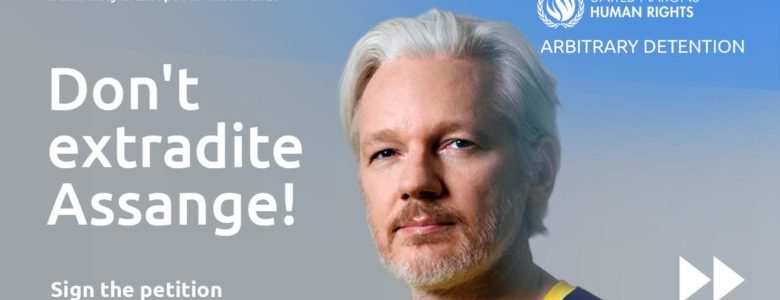
WikiLeaks founder and DiEM25 member Julian Assange arrested!
Today’s arrest of WikiLeaks founder and DiEM25 Advisory Panel member Julian Assange is a chilling demonstration of the current disregard for Human Rights and freedom of speech by establishment powers and the rising far-right. The message is clear: persecute voices of dissent and create an atmosphere of fear.
The illegal termination of Assange’s asylum at Ecuador’s London embassy shows that there are no boundaries in the coordinated crackdown on journalists and activists who are critical of the authoritarian shift that is taking place world-wide – from the US to Turkey, from Hungary to Brazil, and now from Ecuador to… the UK.
“Julian is in custody for breaching bail conditions imposed over a warrant that was… rescinded. Anyone else would be fined and released. Except that Julian Assange’s persecution is all about challenging our right to know about the crimes governments commit in our name,” said DiEM25 founder and European Parliament candidate, Yanis Varoufakis.
We as DieM25 demand that UK authorities do not become accomplices of those whose only intention is to manufacture legal fabrications, narratives and create false enemies among the people. The UK government must to defend people’s rights to freedom of expression and protect those who fight for transparency. This can be the only antidote to preventing the continued rise of the extremists.
We further call on the EU to condemn this atrocious action which undermines the core values of our Union, and reiterate our support for our dear friend and founding member Julian Assange.
Sign the petition against Julian Assange’s extradition to the US: https://i.diem25.org/petitions/1

Welcome to the insane world of global trade
China, the US and the UK all import raw materials on large scale only to be immediately exported again. For example, the US imports one million tons of beef on a yearly basis, and exports 900,000 tons. Codfish arriving on Scottish shores is transported more than ten thousand miles to be filleted in China and only then returned home. Same thing happens to Norwegian salmon, American pigs and basically every basic agricultural product: grain, corn, soy and especially palm oil.
The Netherlands, Europe’s number one transport nation, is at the top of the list. About half of Dutch exports are in re-transit: soy and coal transhipped from sea-going vessels onto river barges, leaving the country within the day. The contribution to the Dutch economy is limited: only 11 cents are earned on every euro exported through re-transit.
Differences in tax subsidies and rates, in environmental directives and in working conditions explain these absurd trade flows. Hence also the detour for iPhones, Volkswagens Golf, Armani suits or a bottle of Heineken.
Tax havens such as the Netherlands have become markets for second-hand letterbox companies. And for ready-made tax avoidance structures. The Netherlands thus plays a key role in skimming and raking up the added value of our consumer goods.
Aside from all the financial crimes involved with this system of global trade, the waste of raw materials and semi-finished products is enormously polluting. “No world trade system without containers, container ships, cargo planes, untaxed fuel oil and kerosene and exceptions in the Paris Convention and the climate agreement,” as Dutch financial geographer Ewald Engelen rightly points out.
It is DiEM’s position that the current EU’s trade policy plays a major role in exploiting workers in non- EU countries, and that radical change is necessary. In its transnational political programme European Spring, ‘just’ trade is the starting point of EU trade policy, not ‘free’ trade. During any trade deal negotiations, European Spring will defend higher standards to protect the environment, human rights, public health, labour rights, public services, animal welfare, and consumer rights. DiEM25 will fight to terminate existing agreements that pose a threat to high standards and human rights.
And DiEM25 demands tax justice. Each year, the EU loses over €1 trillion to corporations and individuals dodging their taxes. European Spring will challenge the laws that allow jurisdictions like Luxembourg, the Netherlands, and Ireland to enable tax evasion. It will introduce a Beneficial Ownership Registry that will require all companies, corporations, and economic entities to declare the identities of their owners and the details of their assets.
Let’s put an end to this absurd and dangerous system of global trade.
Picture credits: localfutures.org
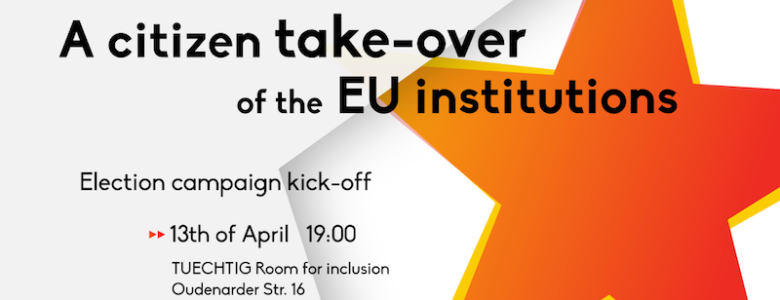
A citizen takeover of the EU institutions
Election campaign kick-off
Discussion with Yanis Varoufakis and other DiEM25-endorsed candidates about a new form of politics
April 13, 2019, 7 pm
TUECHTIG Room for inclusion, Oudenarder Str. 16 (Building D06, floor 1), 13347 Berlin-Wedding
Panelists: Yanis Varoufakis, Daniela Platsch, Bianca Praetorius, Jasper Finkeldey, Joanna Bronowicka, Thomas Kellermann
Buy your ticket here and help us to cover the expenses of the night.
Transnational politics has arrived! The movement DiEM25 facilitates a discussion between citizens and citizen-candidates on the first-ever transnational list for the European elections. These candidates are fighting for a Green New Deal with progressive solutions to bring democracy back to Europe! The women and men, nominated in an experiment in grassroots democracy, who will take the programme to the ballot box in May, will answer all your questions and listen to your input.
Our event will not treat participants as passive listeners. Instead it will be about getting into a dialogue. As our venue is a room for inclusion, our event will be the same. After a short introduction from each panelist, we will jump right into the discussion with you in a fishbowl format. Meaning we will have panels consisting of our candidates and you!
Panel I: The connection between local activism and a European election campaign
- Jasper Finkeldey, organising a campus tour bringing the European Spring to the Universities across Germany
- Joanna Bronowicka, organising the #register2vote campaign ahead of the European Parliament elections
- Thomas Kellermann, activist for the “Aktionsbündnis Lichterfelde Süd” campaigning for social housing since 2011
Panel II: Putting a new form of politics into practice in Europe and beyond
- Yanis Varoufakis, campaigning against austerity politics all across Europe for years
- Daniela Platsch, pledging for a new and people-powered approach to democratise Europe
- Bianca Praetorius, connecting technology with democracy, transparency and sustainability
Moderators: Laura Müller and Johannes Fehr
Join us for the exciting time ahead, not stopping on May 26. This European election is only a start fighting for the change we desperately need!
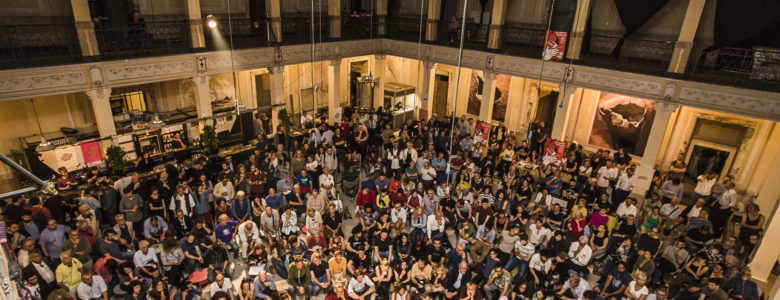
A message of gratitude and support to our Italian Electoral Wing
Comrades,
Following the tight all-member vote regarding our participation in the European Parliament elections in Italy, we are writing to you to express our admiration for your tremendous work over the past year and to discuss our next steps in Italy.
First things first: We all feel a sense of frustration, and regret, that DiEM25 Italia will not be running the European Parliament elections in Italy this coming May. Some amongst you may even feel tempted to surrender to a sense of failure, to an urge to give up. This would be a grave error, we are convinced.
Yes, we failed to bring together a coalition in Italy worthy of DiEM25’s support and participation. But, this is not your failure. The Coordinating Collective wants to make this abundantly clear: You, our Italian Electoral Wing, performed magnificently. You worked diligently and effectively to bring together Italy’s fractious progressive forces into a single list that combines unity with coherence. You came close to producing this miracle. With your hard work, principled political work and unrelenting humanism, you inspired people up and down Italy and elevated progressive forces above their usual low-brow level of discourse. You helped them become better. You improved them. You explained to them the importance of a single, transnational, coherent programme (our New Deal for Europe). You gathered together, in one room, the Left, the Greens, the Mayors, other forces.
The fact that they became better is your legacy. The fact that they did not rise sufficiently to the challenge is their failure. All credit goes to you. And all credit goes to our members, across Europe, for agonising over the dilemma but, in the end, deciding that, no, the resulting list was not coherent enough. That we, DiEMers, will sit this European Parliament election out. Not because we are cowards, but because we are courageous in our pursuit of a new kind of progressive politics, the kind that our potential partners are still incapable of.
Our next step will not be to dissolve our Electoral Wing and pack up. We shall, instead, concentrate on showing progressives the way forward by running with them in local and regional government elections and preparing for the showdown against the fascists and the establishment in the next national elections – which may be just around the corner.
After this week, Italian voters will realise that DiEM25 is not yet another groupuscule of the Left, rushing into any unprincipled coalition in the hope of getting elected. When they ask us: “How shall we vote, given that you are not running?”, we shall reply:
“We wanted to bring together the Left, the Greens and the Municipalists under a single agenda. They would not rise up to the task. So, we refused to run with one against the other. But we are asking you to vote for the Left or for the Greens. Do not abstain. Vote against the establishment, in its various reincarnations, and against the fascists. That’s our duty. Meanwhile, DiEM25 will continue to work to bring progressives together under one roof, with one programme. So, when you see DiEM25 running, you will know the news is good.”
Comrades, our Italian Electoral Wing was created less than a year ago. It did wonders. But it takes more than wonders to unite Italian progressives under a coherent agenda. It will take additional time and even more work. Speaking for all DiEMers, rest assured that our transnational movement will be behind you in this endeavour. All we want from you is that you keep your chins up and that you communicate to us your plans for the next steps.
We shall prevail only because (a) we must and (b) it will be fun trying.
On behalf of DiEM25’s Coordinating Collective,
Carpe DiEM!
Luis
>>DiEM25 Political Director
>>DiEM25 Communications Coordinator
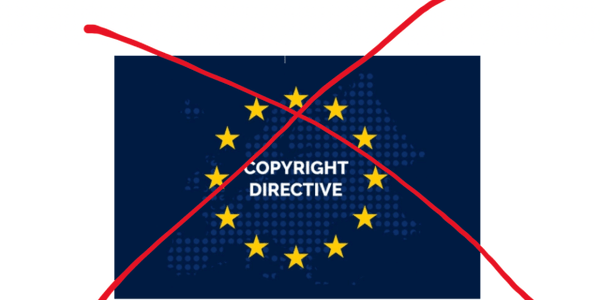
Against the EU Directive on Copyright in the Digital Single Market
My dear fellow Europeans,
I’m speaking to you from the birthplace of democracy about one of the most pressing issues of our time: a key battleground for the defence of our modern democracies. A week ago the European Parliament voted for new legislation that endangers the online freedom of us all: the Directive on Copyright in the Digital Single Market.
This new “directive”, as this kind of EU law is called, falls short of the imperative modernisation that our outdated intellectual property rights require. The goal of every meaningful copyright legislation should be to strike a fair balance between the rights of creators, publishers or producers, and the rights of users. We have witnessed a tremendously exciting increase in human creativity take place through the freedom and inspiration offered through the inter-connectivity of the internet: many more people are able to publish books, create music and explore their creative instincts than ever before.
The new copyright law is making every online platform older than 3 years directly liable for every copyright infringement that a user commits. The analogy for the offline world would be making a highway company directly liable for every speeding driver. The only way for an online platform to deal with this risk of liability is to filter every text, every picture and every video before it’s even uploaded. This upload filter is technology that we so far only know from authoritarian regimes like China. It is quite a wake-up call that so many European politicians are trying to make such upload filters mandatory to prevent “infringements of copyright”. On behalf of the big interests present in our continent, they are enforcing upon citizens a form of censorship that does not belong in our democracies.
Many have warned us against this. The UN Special Rapporteur on Freedom of Expression David Kaye warned the European Parliament about “the risk of error and censorship” with this law. He was joined by the founder of the world wide web Tim Berners-Lee and the one of the inventors of the internet Vint Cerf. Every technologist sees the dangers of this proposal, but yet our politicians refuse to let our interests get in the way of the interests of their rich and powerful friends.
There is still one final chance to prevent the adoption of this dangerous censorship instrument in Europe and this is why I am now speaking to you. On April 15 the Council of the European Union has to agree to this copyright directive. Germany is the swing vote that can single-handedly prevent this law from being adopted. Therefore, I am calling on you Ms Angela Merkel to listen to the people and ask your agriculture minister (how weird is the EU that such a technical matter comes down to the vote of an agriculture minister?) to protect our fundamental right to freedom of speech.
The unleashing of online creativity can be a difficult freedom for us politically-active individuals to handle, as Mr Böhmermann taught me with his middle-finger trickery back in 2015, but it is an important one. Thanks for that lesson, Jan.
Ms Merkel, we’ve had our disagreements, but this question is too important to be decided by party politics or lobby interests. Please Ms Merkel, adhere to your coalition treaty and stop the adoption of this dangerous censorship law.
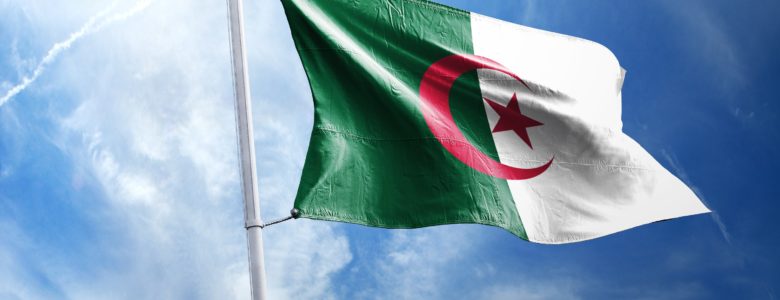
Skepticism and optimism for Algeria
A recent DiEM25 press release celebrated the mass protests that erupted in Algeria following the announcement that the near-catatonic president Abdelaziz Bouteflika might enjoy a fifth term ruling Algeria, a country with a recent history defined by civil wars and tenuous peace, after the victorious overthrow of French colonialism.
Fear of civil war in North Africa has tended toward two political outcomes: conformity to dictatorship, or its peaceful overthrow, as in Tunisia eight years ago.
Now, this peaceful process has come to Algeria. This month, Algerian Prime Minister Noureddine Bedouine announced that a new Algerian parliament of ”youths and the technocrats” is in the works. After throwing bait to cool demonstrators, the government, jolted by the demonstrations, postponed the promised elections.
Thus far, the February 22 movement seems like a high-speed version of the Tunisian revolt, skipping its drawn-out drama. Algerian elites, the military and oligarchs might just suspect that satisfying the twenty-first century cravings and career ambitions of youths will quell the demand for a more just Algeria.
Many young Algerians dreaming of democracy are rightly repulsed by the prospect of Bouteflika governing from his hospital bed. Journalists and human rights organisations that bravely criticised authoritarian abuses will hopefully now reap reward.
But various factions are waiting to exploit the post-Bouteflika Algerian situation — and their aims are far less progressive. Issad Rebab, dissident businessman and owner of the newspaper Liberté, for example, agitates for for neoliberal restructuring.
Berber nationalists, usually reliable opponents of Islamism, may be more divided than Islamists in their position toward the old counterterrorism regime. Many, but not all dissidents strive for enhanced freedoms and less corruption. Others hope for an outcome resembling the Tunisian revolution: the implementation of technocracy, decorated with elements of the old Praetorian guard.
Real solidarity from Europeans means criticism of the movements — to wish Algerians the same freedom from inspectorates, austerity, unjust trade deals and technocratic rule that we demand for Europeans in DiEM25.
Watching Algeria from neighbouring Tunisia, underground samizdat-cartoonist Z, who once undermined dictator Benali, says “as the Algerians rekindle our nostalgia for our 2011 revolution, it also disconcerts us to see Algerians making the same mistakes…among these, the troubling announcement of a future ‘government of youths and technocrats’… Our revolution drew lessons from Algeria: let Algerians now learn from the Tunisian revolution.”
Optimism about refusing Bouteflika’s embalmed fist, may be checked with some weariness, and lessons from the stolen Tunisian revolution: today, Tunisians face austerity and depression since a 2013 loan-deal signed between the Islamist, first democratically-elected Tunisian government and IMF. Initially, the fall of the police state in 2011 brought about a period of euphoria, and of discovering anew the limits of a freedom of expression previously unimaginable to Tunisians, despite knowledge of infiltrators of the abolished regime in the transitional government. A liberal-secular party later accelerated policies reminiscent of technocracies in Southern Europe
By all means, DiEM25 should salute the Algerians. But while doing so, let us not abandon scrutiny by wishing them an inferior political reality to what we aspire to across the Mediterranean.
Arturo Desimone is an Aruban-Argentinean writer and visual artist, currently based between Argentina and the Netherlands.
His articles on politics previously appeared in Open Democracy, CounterPunch, El Andén and various literary journals. For more info see his blog www.arturoblogito.wordpress.com. He’s also member of the thematic DSC ‘Military and foreign policy 1’
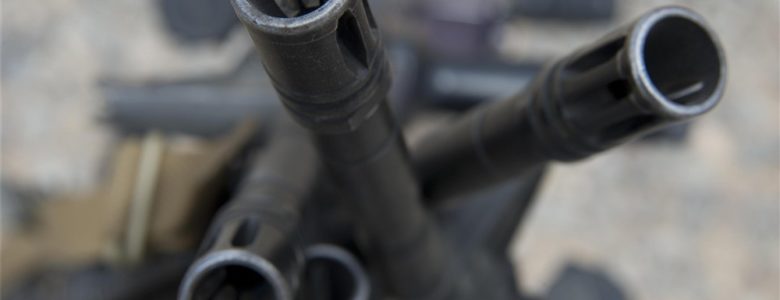
Europe must put an end to unbridled arms trade
European countries must stop selling weapons to states prone to violate the laws of war and human rights. Over the last years, EU States have increased their exports of conventional weapons to countries where genocide, crimes against humanity, war crimes and serious human rights violations are committed. European countries must put an end to exporting violence abroad and abstain from hiding themselves behind the counter-terrorism and national security narratives.
In fact, such legitimate concerns cannot provide a curtain to justify the arms trade, where there are strong suspicions that human rights are in jeopardy and serious concerns of International Humanitarian Law (IHL) breaches. Exports of conventional weapons to countries like Turkmenistan and Saudi Arabia showed how economic interests can overshadow commitments to prevent human suffering.
Between 2008 and 2017, the UK government approved arms exports to 29 of the 30 countries listed by the Foreign and Commonwealth Office (FCO) as “countries of concern”. Similarly, between 2007 and 2017 Italy stood out as the EU major supplier of weapons to Turkmenistan (for a total value of almost 340 million euros in weapons that ended up in Turkmenistan, 257 million euros -76%- came from Italy). French manufactured weapons have been found in Yemen, countering French claims that its sales to Saudi Arabia did not affect the Yemeni crisis, and Dutch weapons continued to be exported to human rights violators in 2017 making the Netherlands the world’s seventh largest arms exporter.
These sales took place despite the evidences and testimonies coming from the Arabian Peninsula or Central Asia. In Yemen, the Saudi-led coalition has been bombing unlawful targets, claiming the lives of thousands of men, women and children and destroying civilian infrastructure. In Turkmenistan human rights are continuously violated, the country was ranked amongst the 20 most corrupt ones in 2018 and labelled as an extremely repressive regime by Human Rights Watch and Amnesty International.
One question, then, arises: can states bear responsibility of how their exported manufactured weapons are used? Certainly, they can and they must.
The EU Common position says that states should assess “exports license applications on a case by case basis” against eight key criteria such as whether international obligations and human rights in the country of final destination as well international humanitarian law and “preservation of regional peace, security and stability” are respected. In the same vein, the Arms Trade Treaty, which entered into force in 2014 and regulates the international trade of conventional arms, has at its heart (Articles 6 and 7) an obligation for countries to assess an overriding risk that a proposed arms export will be used for or contribute to serious human rights abuses. If so, those arms must not be sent.
The EU Common position and Arms Trade Treaty (ATT) have thus introduced a notion of responsibility into the global arms trade that was absent before. However, while the ATT is a legally binding instrument, the EU Common Position is not legally enforceable. European institutions must claim a more significant role in controlling arms exports. First of all, they should improve coordination and harmonisation between countries, fight the fragmentation of different arms export control regimes and better control the maze of co-existing pieces of legislation at both the national and the European level.
Second, the EU Parliament should become a forum for transparency and public scrutiny of the defense sector and member states should abide by good reporting practices on arms trade. Last but not least, EU delegations could contribute by providing intelligence and support in conducting risk assessments before and after arms export to a third country, particularly when EU states lack diplomatic resources to do so. These are only a few examples of how a revivified, democratised Europe could play a significant role in monitoring arms-trade and prevent exporting violence to conflict contexts and authoritarian countries.
With this aim, we ask the EU to actively and concretely promote peace, define a clear mandate and adopt effective tools to enact a joint external policy in the arms trade domain. We call on European states to stop sales and exports of weapons to countries that could perpetrate genocide, crimes against humanity and war crimes, may be violating international humanitarian law or international human rights law, commit an act constituting an offence under international conventions on arms control and disarmament. Lastly, we demand a strengthened role of the EU Parliament in order to guarantee democratic oversight of the defense sector exports.
Camilla Roberti
Member of Thematic DSC Military and Foreign Policy
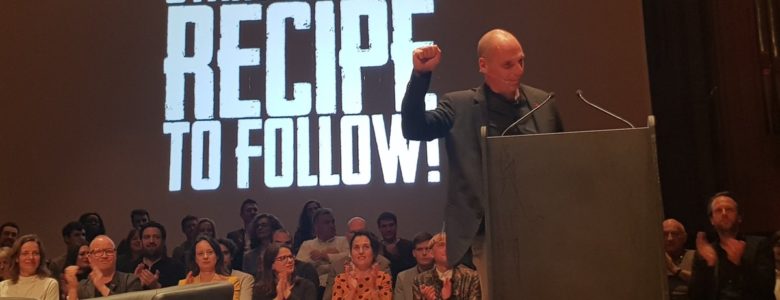
DiEM25 and European Spring launch historic transnational alliance to compete in the 2019 European Parliament election
On Monday, March 25, DiEM25 and European Spring gathered in Brussels to present the women and men from all corners of Europe who will take our common political programme to the ballot on May 25 – like Génération.s’ Benoît Hamon and LIVRE’s Rui Tavares among others – at the BOZAR theatre.
This is where we officially launched our European Spring campaign – embodied in a New Deal for Europe, a set of ambitious economic proposals to save Europe from itself by transforming it.
Missed it? Watch it back by clicking below.
Media coverage:
Germany
Süddeutsche Zeitung: “Schon morgen früh” könnte die EU sozial gerechter sein
RT Deutsch: DiEM25 will Bürgern die Macht über Europa zurückgeben: “Dies ist Sozialismus für Banken”
Spain
El Confidencial: La segunda venida de Varoufakis: vuelve al ruedo la pesadilla de Bruselas
Aqui Europa: PAMELA ANDERSON Y UN ‘NEW DEAL’: VAROUFAKIS LANZA SU CAMPAÑA PARA LAS EUROPEAS
Greece
Ethnos: Η Πάμελα Άντερσον στις Βρυξέλλες, δίπλα στον Γιάνη Βαρουφάκη
Protothema: Βαρουφάκης: Τα τρία μέτρα του ΜέΡΑ25 για ένα ευρωπαϊκό, πράσινο new deal
CNN: Η Πάμελα Άντερσον με τον Βαρουφάκη στην Ευρωπαϊκή Άνοιξη
EU
Euractiv: Stop demonising China, Varoufakis tells Europe
Belgium
MO*: Yanis Varoufakis: ‘De EU wordt geregeerd door een ongeziene oligarchie’
Le Soir: Européennes 2019: une coalition progressiste sous l’étendard du «Printemps européen» aux élections en mai
Le Soir: «Pour un new deal européen»
France
Femme Actuelle: Benoît Hamon et Pamela Anderson : la rencontre improbable
Le Courrier: Pour l’Europe mais autrement
Portugal
Público: Primavera Europeia quer recuperar e não desintegrar a UE